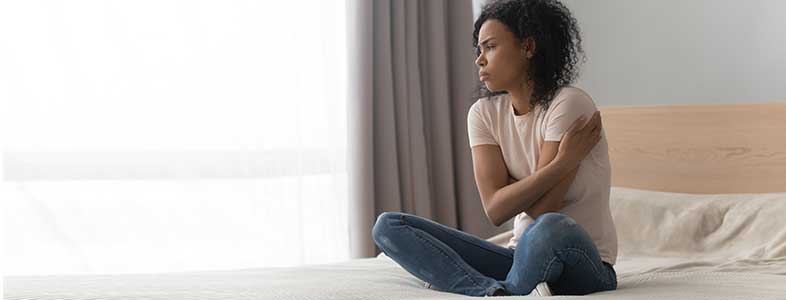
A leading charity has warned the lockdown is storing up a mental health epidemic behind closed doors.
Ian Harrison says he is quietly being driven crazy in his small hostel room in west London. The 30-year-old’s life was chaotic before the coronavirus lockdown. For most of the last 10 years, he has lived either in hostels or on the streets.
He has been sectioned several times, diagnosed as bipolar and spent last Christmas in hospital after taking an overdose. “Living in lockdown in a hostel in a room, it’s not helping because you’ve got time to think,” he says. “And you’re thinking a thousand things at the same time and it drives you crazy – it literally drives you crazy.”
There are 19 people living in Ian’s hostel, which has had to close off the main TV room to avoid social contact between the residents, leaving them more trapped in their box-like rooms.
Although Ian points out everyone still uses the same bathroom and kitchen. He says he doesn’t like watching TV, but he’d like one now, “just for company”. “Life is pretty much being in a room – a square room – for 24 hours a day,” he says. “It just affects your mental health. I know everyone is struggling, but I used to go to the gym twice a day to help my mental health and be in a routine, and now that can’t happen.”
Even in normal times, one in four people experience a mental health problem every year. Leading charity SANE has warned the lockdown is storing up a mental health epidemic behind closed doors. The mental health organisation says it has had a sharp increase in calls relating to domestic abuse.
It also warns that people with serious concerns such as depression, self-harm and suicidal thoughts are not seeking help because they don’t want to bother the stretched NHS.
SANE’s founder and chief executive Marjorie Wallace told Sky News: “People are afraid to access any help because they are taking time away from the NHS. We are going to have untreated mental illness. “And with untreated mental illness we are going to be facing a backlash, an epidemic of mental illness. We need to be prepared to be able to give tremendous support to people who’ve been struggling through these difficult times.”
The charity has a helpline where people can leave a message and get a call back from a professional. Mrs Wallace says there has not just been an increase in calls to the line, but a change in the nature of them. She says: “We’ve been getting many, many calls about domestic abuse and people who’ve already got suicidal feelings, it is making them even more suicidal.”
Recently, a group of therapists has set up a free service to help people struggling through this time. Founder of The Help Hub, Ruth Chaloner, told Sky News: “Any mental health issues that people already have will potentially be amplified during isolation. “Then add on to that the grief that a lot of people will be experiencing from losing loved ones and not being able to see them, and being cut off from close family members. “Also, people being shut in with people they perhaps don’t want to be with, domestic abuse is another issue that is becoming more apparent.”
Another problem is addiction. Ben Robinson was one of 75,000 people treated in England for alcohol addiction last year. The 28-year-old has been dry for 500 days but has been heavily dependent on fellow addicts to support him through recovery. Lockdown is his biggest challenge yet. “It’s a daily battle for me,” says Ben. “Isolation just brings thoughts and fears and worry. Isolation is something we did a lot in the worst of our days. I drank the most when I was on my own. Isolation is simply echoing those thoughts. “Now that the recovery community has been taken away from me, my mind is all over the place.”
Ben has produced mechanisms for getting through the day, and he advises: “Write notes so you don’t forget what you wanted to say when you talk to other people, because those times are further apart now. “It sounds crazy but the number one thing is you need to take time for yourself. To begin with, I had 18 tabs open on my computer from cat adoption to writing courses. I was doing it because I was scared. “So, each day, I try to find a repetitive task that might be a jigsaw or restoring an antique box – something that I can return to at different times of the day, something that is almost a mindless task, to help you thorough. “Unfortunately, that is how I see the days – it’s just getting through them every day.”
The Samaritans have launched a study into the impact of social distancing on our mental well-being. Indicators are that isolation is a real challenge – and it is quietly storing up problems in our communities.
You can find the SANE helpline at sane.org.uk/what_we_do/support/.
Ben is writing a blog to help other addicts at beyondthebottle.net.
The Help Hub can be contacted on thehelphub.co.uk
You can call the Samaritans on 116 123.
Source: news.sky.com




